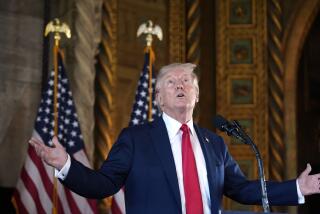Modest New Hampshire Hopes for Gephardt
- Share via
ROCHESTER, N.H. — Crisscrossing this critical early-voting state to meet voters and promote education, Democratic presidential candidate Richard A. Gephardt’s campaign stops Saturday included one to rally a roomful of volunteers about to knock on doors for him.
“Keep going, keep working,” Gephardt exhorted more than a dozen supporters at a community center in Rochester, praising one-to-one voter contact. He predicted victory in 2004 over President Bush -- but stopped short of forecasting a win in New Hampshire’s primary in five weeks.
The Missouri congressman and former House Democratic leader, who invariably asserts he will win on Jan. 19 in Iowa, the first Democratic caucuses, says that he expects to pull off a New Hampshire “surprise.”
Elaborating later, Gephardt shed only a little more light on what that might be.
“Second or third. Maybe a close fourth,” he told reporters. “It’s hard to go through all the scenarios. There’s too many. You’ll know it when you see it.”
Gephardt’s caution reflected a tacit acknowledgment that his campaign has yet to catch fire in New Hampshire, and may never do so, even though he has spent the equivalent of 3 1/2 weeks on the road here in the last year.
As of Saturday, Gephardt lagged behind other candidates for the 2004 Democratic nomination in voter surveys here. Former Vermont Gov. Howard Dean was the consensus front-runner, followed by Sen. John F. Kerry of Massachusetts. Retired Gen. Wesley K. Clark and Sen. Joe Lieberman of Connecticut also appeared to have an edge over Gephardt.
Gephardt not only trailed the three New England native sons, who were expected to do better because of their geographic roots, he was also well behind Clark despite the Arkansan’s late start, in a University of New Hampshire poll released Tuesday. The survey showed just 3% of likely voters backing Gephardt, with the number of undecided voters dwindling rapidly.
Several factors are contributing to Gephardt’s tepid performance in New Hampshire, analysts say, including his support for the Iraq war, an unpopular position with the Democratic electorate here. Labor unions, a key Gephardt constituency, are less influential in New Hampshire than they are in the Midwest.
Another factor is his decision to husband resources for fights elsewhere. Gephardt has not run television advertisements here since early October. With seven field offices in New Hampshire and 17 paid staffers, his state organization is smaller than that of any other leading Democratic candidate.
Faced with similar circumstances in Iowa, Lieberman and Clark chose to concede that state weeks ago. Gephardt, by contrast, has not turned out the lights in New Hampshire, but he has effectively dimmed them.
Gephardt aides say they can ramp up quickly in the state to capitalize on momentum from an Iowa victory in a one-week sprint after the caucuses. They note that Gephardt was able to pull off a similar comeback in New Hampshire in his first presidential race in 1988, placing second to Massachusetts Gov. Michael S. Dukakis after winning in Iowa.
But even after this year’s Iowa contest -- assuming he could beat Dean there -- Gephardt would nonetheless face tough choices about whether to make an all-out push here or to focus instead on several states that choose delegates Feb. 3, including South Carolina.
“It’s about matching the resources you have with where your best returns are,” said J. Mark Wrighton, a political scientist at the University of New Hampshire. “I think you need to spend time here. It’s a pretty good hill for him to climb.”
Gephardt’s state chairman, James M. Demers, said he has had “aggressive discussions” with the campaign’s headquarters in Washington seeking more candidate face time. “All of us in New Hampshire would like to see him here more,” Demers said. “We know that some of our time has shifted to Iowa, but there’s not much we can do about that.”
An energetic Gephardt sought to make the most of his day, with town-hall meetings in Portsmouth and Manchester and an education speech at New England College in Henniker that aides called a major policy address.
In the education speech, Gephardt proposed spending $4 billion a year to recruit 2.5 million public schoolteachers by the end of the decade. The plan, which Gephardt called Teacher Corps, modeled after the military’s Reserve Officer Training Corps, would defray college costs for prospective educators.
Gephardt drew a roar from the student audience when, in an attack on the Bush administration’s funding of the “No Child Left Behind” school reform law, he declared the solution was to “leave George Bush behind.”
In Rochester, meanwhile, a laid-off shipyard worker was knocking on doors for the man who led House Democrats for 13 years.
“I hope he does good,” said Paul Hamel, 44. “According to the polls, he’s not.” But, Hamel added, surveys can be wrong.
More to Read
Get the L.A. Times Politics newsletter
Deeply reported insights into legislation, politics and policy from Sacramento, Washington and beyond. In your inbox twice per week.
You may occasionally receive promotional content from the Los Angeles Times.










